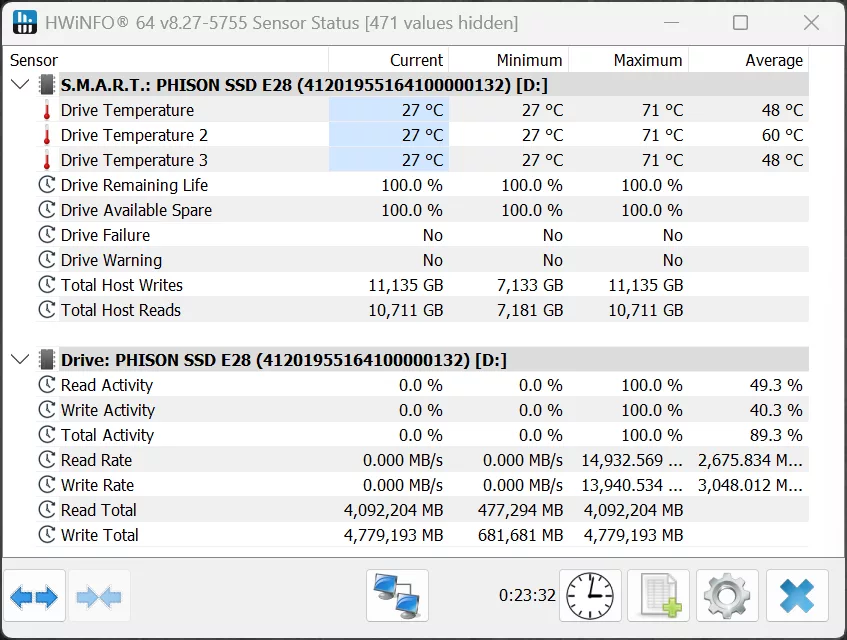Conclusion
This has been our first look at Phison’s E28 controller with the Phison PS5028-E28 Reference Design 2TB NVMe M.2 PCIe 5.0 x4 SSD. The Phison E28 controller will be replacing the popular E26, improving upon it with a new processing node using TSMC’s 6nm process, thus reducing power and temperature. Performance gains and optimizations have been made, and with KIOXIA BiCS8 3D TLC NAND Flash at 2400MT/s, the Phison PS5028-E28 Reference Design 2TB SSD has some pretty amazing performance. We do think the improved efficiency and temperatures will help PCIe Gen5 SSDs become more popular in laptops and notebooks as well.
Temperature

The goal of our temperature testing is to push the SSDs as hard as possible by performing a stress test of read and write. We run PerformanceTESTS’s advanced disk benchmark with a 10GB file, set to run each read/write test for 3 iterations, culminating in a 30-minute run. This is not typical usage behavior, but our goal is to find the maximum limits of the cooling. We utilize HWiNFO64 for reporting SSD temperatures.
The Phison PS5028-E28 Reference Design 2TB SSD, being a reference SSD, is a bare drive, and we have not installed third-party cooling. With an active fan blowing across the SSD, you can see that the temperatures all hit a maximum of 71c, that is Drive Temperature being NAND flash temp, Drive Temperature 2 being ASIC temp, and Drive Temperature 3 being NAND flash temp. While 71c was the peak temp reported here, it was just a peak, not a sustained, consistent average.
The average temp, according to HWiNFO64, from starting the benchmark run to finish, resulted in an average ASIC temp of 60c, and an average NAND flash temp of 48c. Therefore, we can see that from a bare drive perspective, no heatsink or cooling, but using a fan, it peaked within its operating range, at the high-end of its operating range, but not at a temperature that would cause it to thermal throttle. The idle temperature was 27c.
We can conclude from this that with a motherboard M.2 heatsink, or third-party cooling, it will indeed remain well tamed in system builds. It doesn’t look like exotic cooling builds will be necessary to keep the E28 in check. It might actually be possible to have 14GB/s read/write performance sustained, and not require an enormous heatsink like we’ve seen with many Gen5 drives lately, though we still do recommend a heatsink of course, this still isn’t the kind of drive you would want to run bare, without some form of cooling in place. We will have to get some partner models in to test their cooling abilities individually.
Final Points
Good things are coming in the consumer storage space with the new Phison E28 controller. Right now, manufacturers have the reference design and are gauging performance, optimizing, and devising their own cooling configurations and segmentation. There are more optimizations to come, as this was a pre-release firmware, and it will only get better from here.
In our performance, we found the Phison PS5028-E28 Reference Design 2TB SSD to perform extremely well, topping the charts in pretty much everything. We had several drives in our lineup that were based on the previous generation Phison E26 controller, and they used to be the performance champs, until now. In 3DMark Storage and PCMark 10 Storage tests, the Phison PS5028-E28 Reference Design 2TB SSD was the fastest drive. It did particularly well in access time latency performance, and owned PassMark.
In our throughput testing, the Phison PS5028-E28 Reference Design 2TB SSD performed very well, hitting its advertised sequential read and sequential write performance precisely on point. This performance level is the highest we’ve seen in a consumer SSD and thoroughly beats the Phison E26 controller SSDs. The Phison PS5028-E28 Reference Design 2TB SSD was particularly strong in write performance, both sequential and random writes. It blew the doors off of everything else on random 4K Q32T16 write performance, with just downright impressive performance.
Game load times were also the best with the Phison PS5028-E28 Reference Design 2TB SSD, though the performance was tight among the Gen5 SSDs, the Phison PS5028-E28 Reference Design 2TB SSD did stand out above the rest. It has fast DirectStorage support, and even if the game doesn’t support DirectStorage it manages to have fast load times. File copy performance was also outstanding, with the best large file size copy performance, and it did very well with a large Steam Library. We were also highly encouraged by the SPECworkstation 3.1 performance for workstation applications.
There is no question that the Phison PS5028-E28 controller is Phison’s best consumer controller for storage to date. We are finally reaching the levels of performance that was promised to us in regards to PCIe 5.0 Gen5 NVMe SSD storage. The Phison PS5028-E28 Reference Design 2TB SSD hits sequential read/write performance that is nearing the theoretical max for the interface, and the improved Phison E28 on the 6nm process node runs very efficiently, with the best power profile to date, and manageable temperatures.
We can see a wide application for this controller, on both DIY consumer PCs, notebooks, and up to the workstation and enterprise sectors. We can’t wait to see what products partner models come out with; it’s a whole new generation of storage excitement for the consumer PC space. If you’ve been holding out for a PCIe Gen5 SSD, new drives coming with the Phison E28 controller may be worth the wait.

Note that our overall score and Award are based on our testing, thoughts, analysis, and conclusion of the Phison E28 SOC, not the SSD itself, which is not a product sold; this is about the technology.
